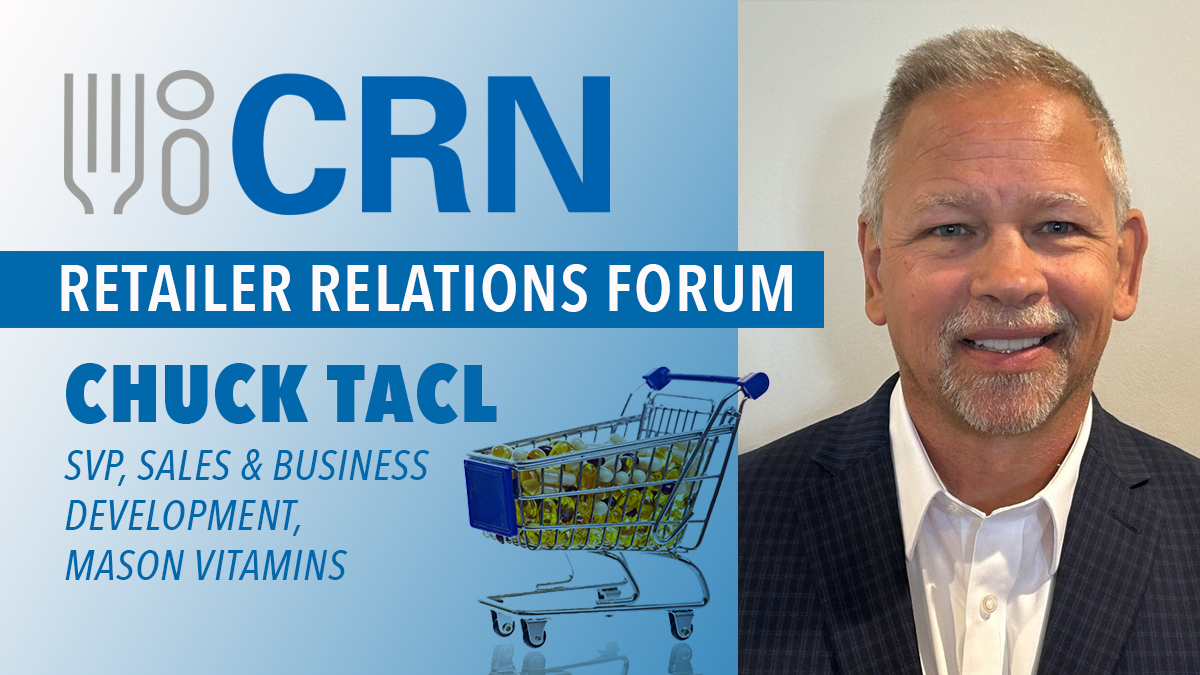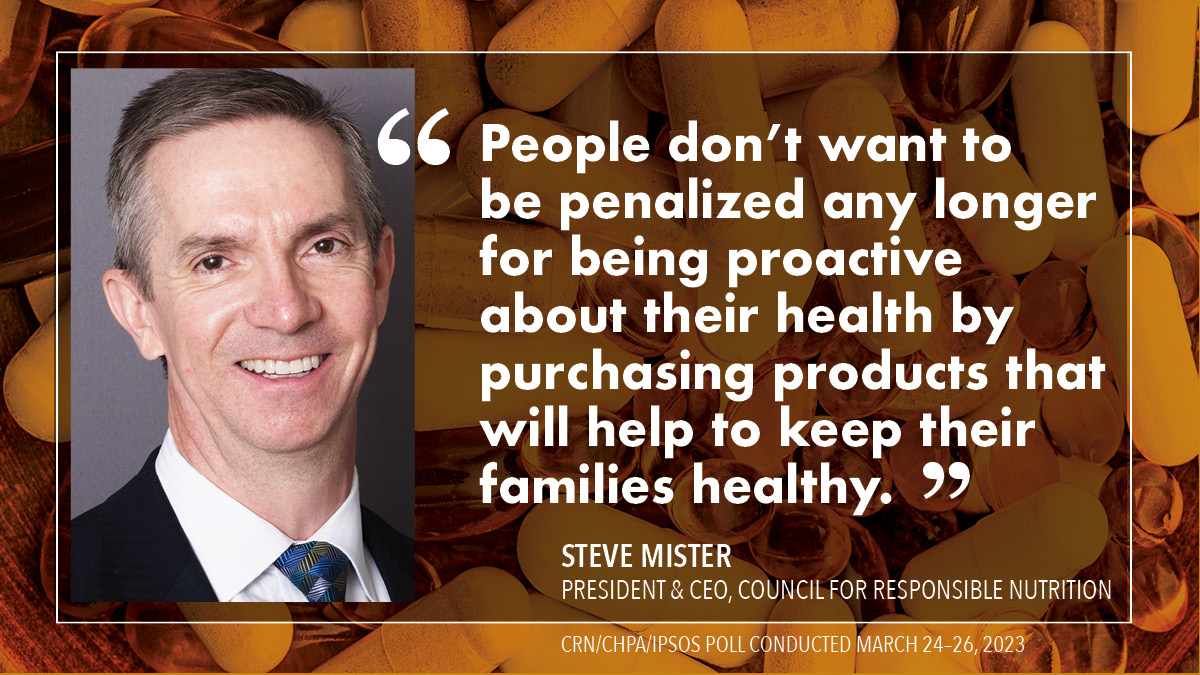
Past Editions—Need to Know Archives
In this edition:
-
Chuck Tacl, Mason Vitamins, named new Retailer Relations Forum chair; breakfast event set for NACDS TSE
-
CRN calls for pushback on proposed FDA reorganization that would diminish supplement oversight
-
Will New York become the first state to age restrict dietary supplements?
-
Survey indicates consumers want supplements included in their FSA/HSA Coverage
-
Drug Preclusion threatens future innovation of supplements
CRN appoints new Retailer Relations Forum chair; breakfast event at NACDS TSE

Mason Vitamins’ SVP, Sales & Business Development Chuck Tacl was recently appointed chair of CRN’s Retailer Relations Forum (RRF).
CRN’s RRF is open by invitation to senior sales and customer officers from CRN member companies that market finished dietary supplements and functional food to mass retailers in the chain drug, grocery, box store, and club venues.
What’s next: RRF is making plans for its upcoming NACDS breakfast meeting Sunday, Aug. 13, featuring:
-
Colleen Lindholz, President, Kroger Health, plus one of her supplement category buyers (TBD);
-
A senior buyer for supplements at HyVee, Inc.; and
-
Caroline Davidson, Senior Director, Strategic Partnerships, SPINS LLC
CRN calls for pushback on proposed FDA reorganization that would diminish supplement oversight
CRN is urging retailers, consumer groups, and other industry stakeholders to let their congressional representatives know FDA’s proposed reorganization would de-prioritize dietary supplements, reducing needed enforcement and regulation. The proposed changes would eliminate the Office of Dietary Supplement Programs (ODSP) at the agency, jeopardizing consumers and hurting an industry that contributes to their districts’ public health and economy.
-
Following its statement in response to newly-released details of FDA’s plans to restructure its Human Foods program, CRN also called on FDA Commissioner Robert Califf to meet with association leadership about the future of dietary supplement regulation under the newly proposed framework.
Why it matters: “For our industry, this means that the attention and priority given to dietary supplements, even as little as it was before, will be even less in this new structure,” CRN President & CEO Steve Mister and SVP Scientific & Regulatory Affairs Andrea Wong, Ph.D., noted in a letter to Commissioner Califf.
The 75% of Americans who use dietary supplements “deserve to have an agency overseeing this market that acknowledges their health benefits and devotes adequate resources to effectively regulate the market,” CRN’s letter explained.
-
CRN questioned why the agency is pulling back on its responsibility to effectively regulate dietary supplements when the industry is estimated at nearly $60 billion.
What we’re saying: “The dietary supplement industry has successfully lobbied Congress to more than double annual ODSP funding to assure increasing attention and enforcement. The proposed reorganization jeopardizes those advances that reinforce consumer trust in these products,” observed Mister and Dr. Wong.
States: NY age restrictions advance to the Governor; CA would ban TiO2

New York could become the first state to impose age restrictions on dietary supplements for weight management and sports nutrition. The legislation that would limit sales to those under 18 years old has passed both the Assembly and the Senate and will go to Governor Kathy Hochul for a final decision. It restricts a range of products from pre-workouts to protein powders.
-
Working with retail coalitions, CRN has strongly opposed the bill in eight states. Proponents suggest these product cause eating disorders and other forms of body dysmorphia, but cannot point to any data to support their claims. A recent review of the science demonstrated that there is no causal relationship between supplements and these disorders.
-
These age restrictions unfairly target traditional stores because they are unenforceable against online retailers. Young people will still get access to these product from internet purchases.
-
Retailers can still express their opposition to Governor Hochul by contacting her office to say they oppose age restrictions on safe and beneficial supplements for weight management and sports nutrition.
Separately, California legislation that would prohibit the sale or distribution of any food product that includes titanium dioxide (TiO2), among other ingredients (CA A.B. 418) advanced out of the California Senate Environmental Quality Committee on July 12.TiO2 is a common food additive in a wide range of consumer products.
-
The bill includes amended language that would delay implementation for all products captured under the proposal, which would be implemented on Jan. 1, 2027. It would provide an unlimited sell-through period prior to the law going into effect—allowing products containing TiO2 to still be sold if manufactured prior to Jan. 1, 2027.
-
CRN is advocating for an unlimited sell-through period prior to the law going into effect.
Consumers want ‘choice’ to include dietary supplements in FSA/HSA coverage; data show it’s smart choice for U.S. economy too

Nearly eight out-of-10 respondents (78%) who have a flexible spending account (FSA) or health savings account (HSA) want to be reimbursed from their accounts for dietary supplement purchases, according to findings of an Ipsos survey jointly commissioned by CRN and the Consumer Healthcare Products Association (CHPA).
Expanding access to supplements is a priority for CRN in 2023, with new legislation, Dietary Supplements Access Act, introduced today to recognize supplements as a “qualified medical expense.”
The new survey data also addresses concerns that expanding allowable medical expenses to include supplements would reduce tax revenue, revealing:
-
Just 34% of FSA/HSA holders would increase their contributions. Other economic factors dictate how much consumers put into their accounts—they want more choice but wouldn’t necessarily divert more of their take-home pay into these healthcare accounts.
Yes, and: CRN’s “Supplements to Savings” report indicates the use of dietary supplement ingredients by targeted populations can increase quality of life and significantly reduce direct and indirect medical costs related to health conditions such as coronary artery disease, osteoporosis, and more.
The big picture: “Americans are using dietary supplements and saving the country billions in healthcare costs,” added Mister. “Any tax-revenue hit the federal government would experience would be offset by the overall savings to the healthcare system. It makes sense for consumers—and the country.”
FDA’s application of ‘Drug Preclusion’ threatens innovation in supplements

CRN recently filed a Citizen Petition with FDA objecting to its use of a controversial provision called “Drug Preclusion” to stop the sale of certain ingredients as dietary supplements. The Drug Preclusion provision prohibits the sale of dietary supplements using an ingredient that has previously been marketed as a drug or has been the subject of substantial clinical investigation for drug purposes. FDA has invoked the principle to halt sales of N-acetyl cysteine (NAC, before reversing and announcing enforcement discretion earlier this year) and NMN.
-
CRN has called on FDA to rethink its application of the provision, recognizing that differences in routes of administration, biological mechanisms of action, pharmacological effects, recommended dosage and serving amounts, composition of the article, and differences in the intended use all support findings that the two products are not the “same article.
-
Dietary supplements that were on the market prior to 1994, when the controversial provision was enacted as part of DSHEA, should be grandfathered under the provision. FDA has invoked research going back to the 1960s to remove ingredients that pre-date the passage of DSHEA.
-
CRN also called out the agency for allowing ingredients into the supplement market under the New Dietary Ingredient notification process and then changing that decision and revoking the ingredient based on unpublished approvals of Investigational New Drugs (INDs). “It’s like buying a house, getting a ‘clean’ title search and finding out months later that there was a lien on the property and you not allowed to live in it,” said CRN’s president & CEO Steve Mister.

